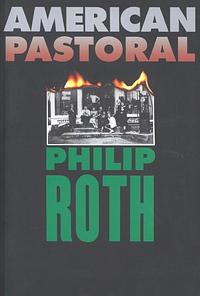Take a photo of a barcode or cover
challenging
emotional
reflective
slow-paced
Plot or Character Driven:
Character
Strong character development:
Complicated
Loveable characters:
Complicated
Diverse cast of characters:
Complicated
Flaws of characters a main focus:
Yes
“The fact remains that getting people right is not what living is all about anyway. It’s getting them wrong that is living, getting them wrong and wrong and wrong and then, on careful reconsideration, getting them wrong again. That’s how we know we’re alive: we’re wrong. Maybe the best thing would be to forget being right or wrong about people and just go along for the ride. But if you can do that- well, lucky you.”
“Who is set up for tragedy and the incomprehensibility of suffering? Nobody. The tragedy of the man not set up for tragedy- that is every man’s tragedy.”
“Who is set up for tragedy and the incomprehensibility of suffering? Nobody. The tragedy of the man not set up for tragedy- that is every man’s tragedy.”
Bien parti pour du 5/5 mais toute la dernière partie est un peu indigeste, on a compris, c’est la pastorale américaine qui explose
dark
reflective
tense
slow-paced
Plot or Character Driven:
Character
Strong character development:
No
Loveable characters:
No
Diverse cast of characters:
No
Flaws of characters a main focus:
Yes
Having read too much poor to middling prose recently, I was delighted to read something by a writer who has mastered the craft.
In Roth's prose, one is at home and at ease. There is nothing forced or fake. His prose flows naturally and effusively, and his narrative takes shape effortlessly and entertainingly. The dialogue sounds like what actual people say when they talk. His characters are real. They are likable. There is nothing in them that strikes a false note, even among the minor characters (for example, the radical literature professor, Marcia Umanoff, who has a wonderfully entertaining argument with Lou Levov in the final section of the novel).
I was even reminded a bit of Melville in reading American Pastoral. Melville took long tangents in Moby-Dick to explain the details and trivialities of the whaling industry, and I was utterly fascinated by what I learned. Similarly, Roth takes an equally obscure industry, glove-making, and spends pages and pages describing what goes into making gloves, and I was very much interested in and entertained by these sections.
American Pastoral won a Pulitzer, and it is easy to see why: Roth has created an epic story of an American tragedy, of a family, the Levovs, that rose from poor immigrants to great success in the glove-making business, seeming to live the American dream only to have the dream shattered by the actions of Merry Levov, the daughter of the protagonist, the Swede (the Swede being the nickname of Seymour Levov).
American Pastoral is the story of many people--Lou Levov, the Swede (primarily the story of the Swede), Dawn Levov, Jerry Love, Merry Levov--and both the ordinary, everyday aspects of their lives as well as the momentous events that radically altered the course of their lives. It is a story told with a deft touch, with a great grasp of the human psyche, and it is compelling from beginning to end.
In Roth's prose, one is at home and at ease. There is nothing forced or fake. His prose flows naturally and effusively, and his narrative takes shape effortlessly and entertainingly. The dialogue sounds like what actual people say when they talk. His characters are real. They are likable. There is nothing in them that strikes a false note, even among the minor characters (for example, the radical literature professor, Marcia Umanoff, who has a wonderfully entertaining argument with Lou Levov in the final section of the novel).
I was even reminded a bit of Melville in reading American Pastoral. Melville took long tangents in Moby-Dick to explain the details and trivialities of the whaling industry, and I was utterly fascinated by what I learned. Similarly, Roth takes an equally obscure industry, glove-making, and spends pages and pages describing what goes into making gloves, and I was very much interested in and entertained by these sections.
American Pastoral won a Pulitzer, and it is easy to see why: Roth has created an epic story of an American tragedy, of a family, the Levovs, that rose from poor immigrants to great success in the glove-making business, seeming to live the American dream only to have the dream shattered by the actions of Merry Levov, the daughter of the protagonist, the Swede (the Swede being the nickname of Seymour Levov).
American Pastoral is the story of many people--Lou Levov, the Swede (primarily the story of the Swede), Dawn Levov, Jerry Love, Merry Levov--and both the ordinary, everyday aspects of their lives as well as the momentous events that radically altered the course of their lives. It is a story told with a deft touch, with a great grasp of the human psyche, and it is compelling from beginning to end.
dark
emotional
tense
medium-paced
Plot or Character Driven:
A mix
Strong character development:
Complicated
Loveable characters:
Complicated
Flaws of characters a main focus:
Yes
My second, after Nemesis, book by Roth. Clearly, I read them the wrong way round, as ‘The American Pastoral’ is the original 'Nemesis'. It’s the same story of an all-round American Golden Boy broken and destroyed, although here it’s women who do the breaking and destroying. The Swede, our Golden Boy is undone first by his daughter and then by his wife. But then he remarries and has three sons and life is good and wholesome again. It’s almost comical the way every single woman in this book is responsible for the downfall of at least one good man. I was ready to get all angry at Roth as I had this preconceived notion he was misogynistic but then I thought deeper of this book, and an alternative interpretation occurred to me. I honestly don’t know if this is what Roth meant but Barthes told me the author was dead, so hear me out. Maybe all these angry, imbalanced, violent women just had it up to here with patriarchy, oppression, capitalism. Maybe the angry women and the angry blacks (who also feature in this novel to the main character’s puzzlement, after all, they had it so good before) had it up to here with these upstanding citizens, American Golden Boys and their freaking American Dream – they are out to destroy it.
I don’t know if Roth is or isn’t a misogynist but there is enough ambiguity about him to make sure that Nobel Prize is never going to happen. John Sutherland said it quite nicely in Love, Sex, Death and Words:
“One of the things that hobbles the Nobel Literature Prize is its founder’s instruction that it should be awarded to the author of ‘the most outstanding work in an ideal direction’. There is argument about how idealisk (in the old dynamitard’s original Swedish) should be translated. But the basic instruction is clear – the laureate should be on the side of the angels. The ‘idealisk’ criterion probably also explains why Philip Roth (many things – but no angel) has never been honoured. It also explains why, lest some bombshell is dropped later, the committee usually aim to get in just ahead of the undertaker (the two of them practically got jammed in the door with poor Harold Pinter, the 2005 honoree).”
All that aside, Roth’s prose shines. Even the lengthy passages devoted to describing in painstaking detail the process of glove making are somehow endearing. Other passages, especially the scene and the aftermath of the almost-incest incident were very powerful. I found the writing less annoying than in Nemesis and I even enjoyed the framing narrative, although it would be nice if Roth hadn’t forgotten what he was doing and closed the frame in the end as well.
A quick note on the proposed film cast – Ewan McGregor? No! He looks nothing like the Swede. You know who looks like the Swede? Tom Hardy. I know he is a bit on the short side but as Swede’s wife Dawn, Miss New Jersey 1949 was supposed to be tiny just cast Reese Witherspoon and anyone will look tall next to her. Also, Reese would be an excellent choice, she has exactly that short, tiny lady charisma I imagined Dawn to have.
* edit: I reread this review just now and I wonder if my (and Sutherland's) comments about the Nobel Prize still hold true vis a vis Handke's award last year.
I don’t know if Roth is or isn’t a misogynist but there is enough ambiguity about him to make sure that Nobel Prize is never going to happen. John Sutherland said it quite nicely in Love, Sex, Death and Words:
“One of the things that hobbles the Nobel Literature Prize is its founder’s instruction that it should be awarded to the author of ‘the most outstanding work in an ideal direction’. There is argument about how idealisk (in the old dynamitard’s original Swedish) should be translated. But the basic instruction is clear – the laureate should be on the side of the angels. The ‘idealisk’ criterion probably also explains why Philip Roth (many things – but no angel) has never been honoured. It also explains why, lest some bombshell is dropped later, the committee usually aim to get in just ahead of the undertaker (the two of them practically got jammed in the door with poor Harold Pinter, the 2005 honoree).”
All that aside, Roth’s prose shines. Even the lengthy passages devoted to describing in painstaking detail the process of glove making are somehow endearing. Other passages, especially the scene and the aftermath of the almost-incest incident were very powerful. I found the writing less annoying than in Nemesis and I even enjoyed the framing narrative, although it would be nice if Roth hadn’t forgotten what he was doing and closed the frame in the end as well.
A quick note on the proposed film cast – Ewan McGregor? No! He looks nothing like the Swede. You know who looks like the Swede? Tom Hardy. I know he is a bit on the short side but as Swede’s wife Dawn, Miss New Jersey 1949 was supposed to be tiny just cast Reese Witherspoon and anyone will look tall next to her. Also, Reese would be an excellent choice, she has exactly that short, tiny lady charisma I imagined Dawn to have.
* edit: I reread this review just now and I wonder if my (and Sutherland's) comments about the Nobel Prize still hold true vis a vis Handke's award last year.
An angry book, one that's overwritten and overwrought. Wish it were 100 pages shorter. Philip Roth nevertheless remains a force to be reckoned with.
challenging
informative
reflective
slow-paced
I liked the writing a lot. The story was interesting but I was mad at how he ended it. Some parts were a little too detailed/graphic for me. There were more “F” words than I thought there would be too.



